Blockchain for E Commerce: Smarter, Safer Online Shopping
- BLOG
- Blockchain
- December 10, 2025
Online shoppers and businesses face increasing risks, data breaches, counterfeit products, payment fraud, and unreliable supply chains. These issues weaken trust and add complexity to an already competitive e-commerce landscape. As digital transactions grow, so does the demand for a system that can provide security, authenticity, and transparency without slowing down operations.
This is where blockchain for e commerce becomes transformative. By decentralizing data, strengthening security, and enabling smarter automation through technologies like smart contracts in e commerce, blockchain creates a safer and more efficient ecosystem for buyers and sellers alike.
In this guide, we explore how blockchain reshapes online shopping, its key benefits, real-world applications, challenges, and how Webisoft helps businesses adopt dependable blockchain e commerce solutions.
Contents
- 1 What Is Blockchain for E-Commerce?
- 2 Key Benefits of Blockchain in E-Commerce
- 3 Top Blockchain Applications in E-Commerce
- 4 How Blockchain Can Transform the E-Commerce Marketplace
- 5 Real Examples of Blockchain-Based E-Commerce Platforms
- 6 Enhance your e-commerce ecosystem with secure and scalable blockchain solutions from Webisoft.
- 7 Challenges of Using Blockchain in the E-Commerce Industry
- 8 Best Practices for Blockchain Integration in E-Commerce
- 9 The Future of Blockchain and Cryptocurrency in E-Commerce
- 10 How Webisoft Helps You Integrate Blockchain for E-Commerce
- 11 Enhance your e-commerce ecosystem with secure and scalable blockchain solutions from Webisoft.
- 12 Final Thoughts on Blockchain for E-Commerce
- 13 Frequently Asked Questions (FAQs)
What Is Blockchain for E-Commerce?
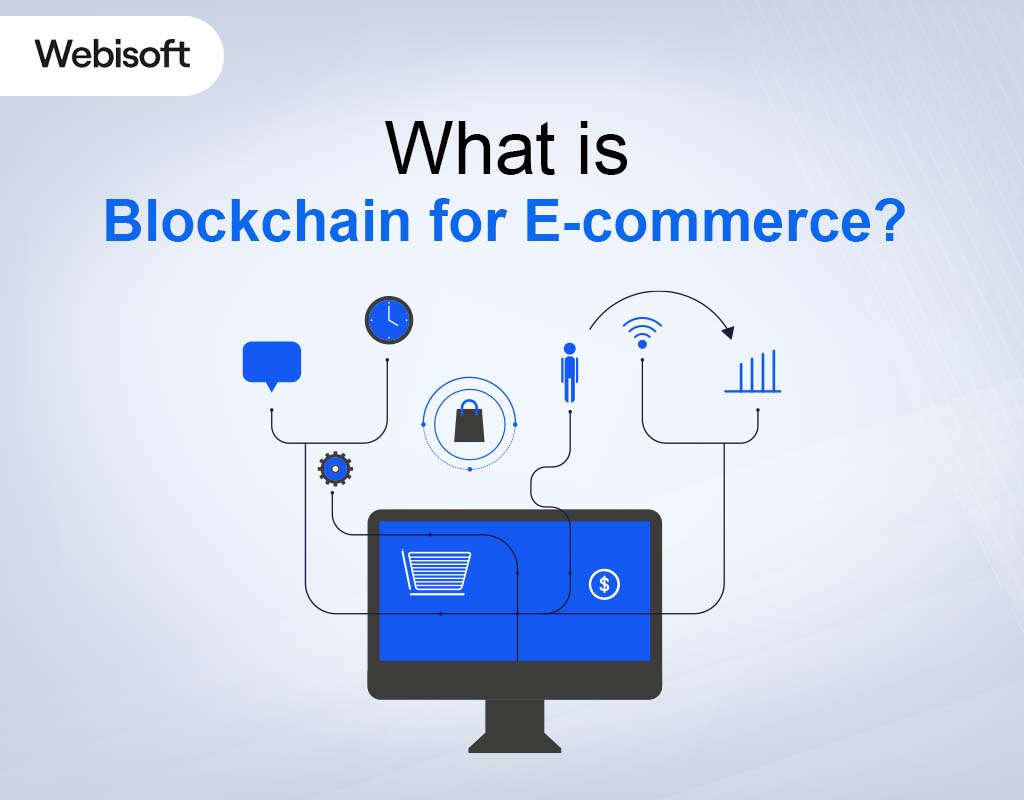 Blockchain for e commerce refers to the use of decentralized ledger technology to enhance how online transactions, payments, and digital interactions are processed. Instead of relying on a central authority, blockchain distributes data across multiple nodes, making it far more resistant to tampering, fraud, and unauthorized changes.
Blockchain for e commerce refers to the use of decentralized ledger technology to enhance how online transactions, payments, and digital interactions are processed. Instead of relying on a central authority, blockchain distributes data across multiple nodes, making it far more resistant to tampering, fraud, and unauthorized changes.
This decentralized structure is especially valuable in online retail environments where security and trust are critical. In practical terms, blockchain records each transaction inside encrypted digital blocks that are linked together in chronological order.
Once recorded, the information cannot be modified, creating a transparent and tamper-proof trail of activity. This foundation enables new forms of blockchain e commerce solutions, including secure payments, verified product origins, automated contract execution, and more efficient supply chain processes.
Blockchain’s transparency, immutability, and automated validation make it uniquely suited for addressing long-standing challenges in digital commerce, from counterfeit products to data breaches and inefficient logistics systems.
Key Benefits of Blockchain in E-Commerce
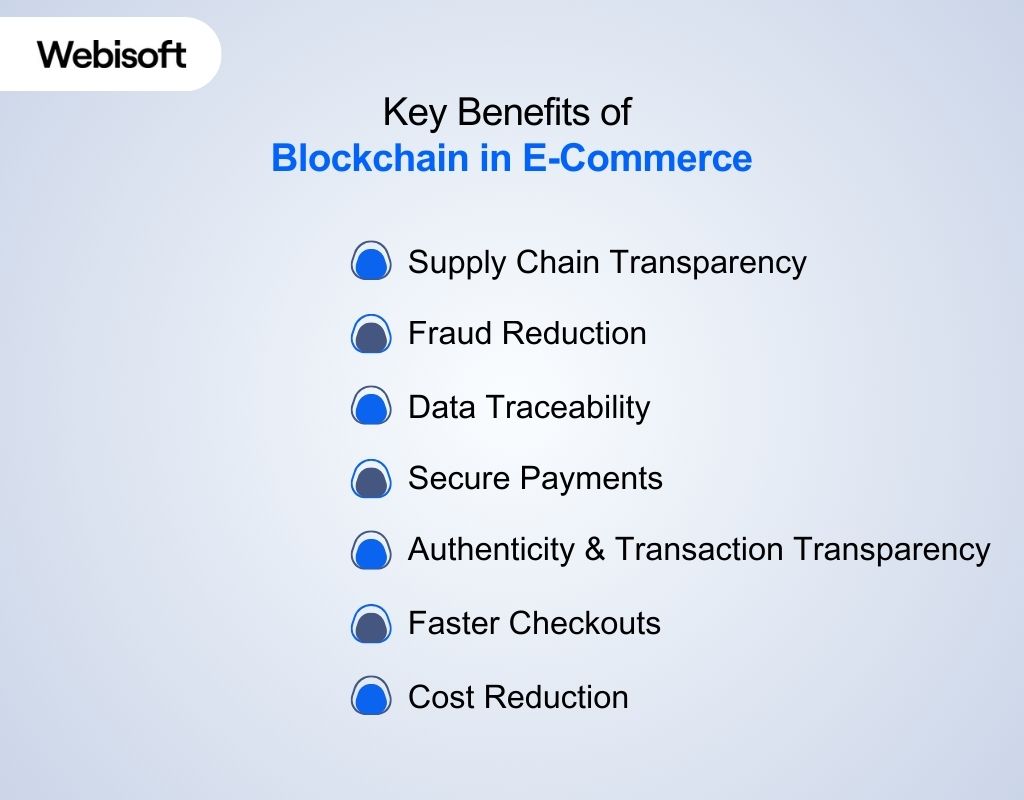 Blockchain brings several powerful advantages to the e-commerce sector. These benefits of blockchain in e commerce directly enhance security, consumer trust, and operational efficiency while simplifying the flow of goods and payments across global markets.
Blockchain brings several powerful advantages to the e-commerce sector. These benefits of blockchain in e commerce directly enhance security, consumer trust, and operational efficiency while simplifying the flow of goods and payments across global markets.
Supply Chain Transparency
Blockchain for e commerce allows every step of the supply chain to be recorded and verified.Customers and businesses can trace a product’s origins, shipment path, and authenticity, reducing the risk of counterfeit goods entering the market.
Fraud Reduction
Blockchain has yet to revolutionize the whole e commerce market. But it already has a great impact on markets. Because every transaction is logged in a tamper-resistant ledger, it becomes extremely difficult for scammers to manipulate order data, payment information, or refund processes. This creates a safer environment for buyers and sellers.
Data Traceability
Retailers gain complete visibility into product movement, inventory status, and supplier behavior. This traceability improves operational accuracy and accountability throughout the entire commerce lifecycle.
Secure Payments
Blockchain enhances payment security by encrypting data and enabling direct transactions without exposing sensitive customer information. This reduces fraud risks and minimizes dependence on intermediaries.
Authenticity & Transaction Transparency
Every action made on the blockchain can be reviewed by authorized parties. This transparency increases trust and helps verify that services, goods, and warranties are genuine.
Faster Checkouts
Automated validation and decentralized verification shorten transaction times. Customers experience quicker payments, and businesses reduce processing delays.
Cost Reduction
Removing intermediaries reduces transaction fees and administrative overhead costs. The result is a leaner, more efficient e-commerce operation.
Top Blockchain Applications in E-Commerce
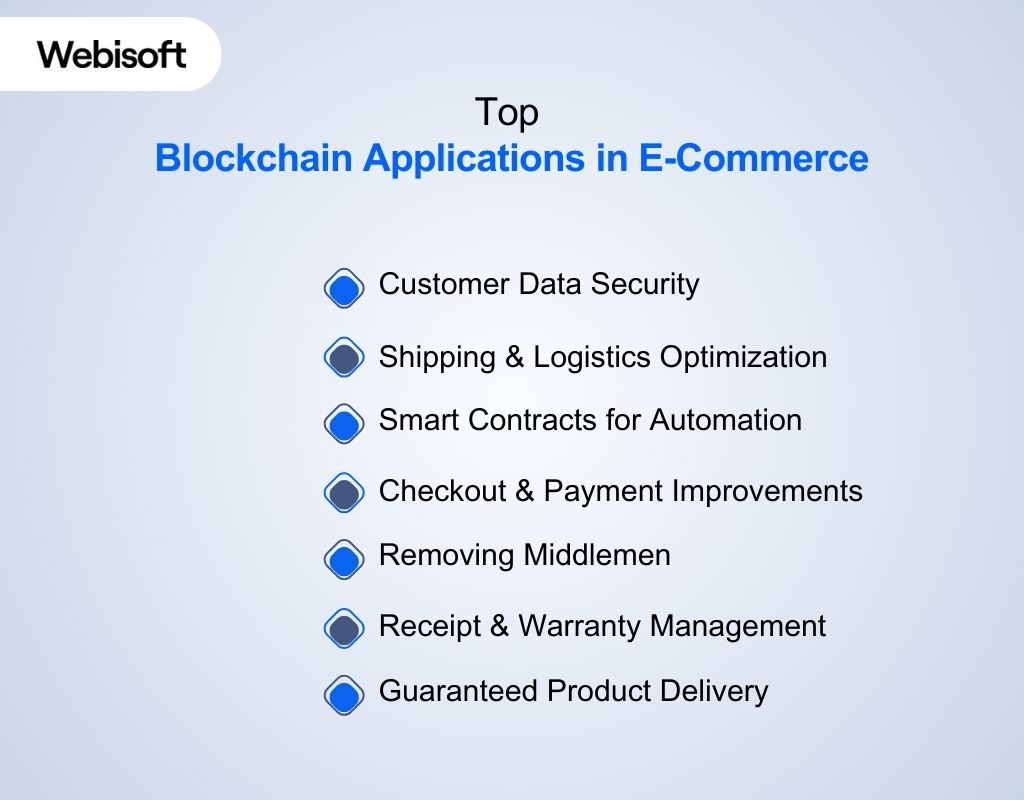 Blockchain introduces practical, high-impact improvements across the online shopping landscape. These blockchain applications in e commerce help retailers strengthen security, streamline operations, and deliver better customer experiences. Below are the most valuable ways blockchain is transforming digital commerce today.
Blockchain introduces practical, high-impact improvements across the online shopping landscape. These blockchain applications in e commerce help retailers strengthen security, streamline operations, and deliver better customer experiences. Below are the most valuable ways blockchain is transforming digital commerce today.
Customer Data Security
Blockchain encrypts sensitive customer information and distributes it across a decentralized network, making unauthorized access extremely difficult. This reduces the risk of breaches and protects personal details during account creation, checkout, and payment processing.
Shipping & Logistics Optimization
By recording shipping data on a transparent ledger, blockchain reduces errors, prevents lost shipments, and ensures accurate delivery tracking. Retailers and customers can verify real-time updates, lowering disputes and improving trust in the delivery process.
Smart Contracts for Automation
One of the most impactful advancements is the use of smart contracts in e commerce. These self-executing agreements automate actions like releasing payments, updating inventory, or triggering refunds once predefined conditions are met. This eliminates manual oversight and reduces human error.
Checkout & Payment Improvements
Blockchain enables faster, more secure payment processing. Transactions bypass traditional intermediaries, reducing fees and minimizing delays. It’s especially effective for global e-commerce where cross-border transaction costs can otherwise be high.
Removing Middlemen
Decentralization through blockchain for e commerce reduces dependency on payment processors, authentication services, and logistical brokers. By cutting out unnecessary intermediaries, businesses benefit from lower costs and greater control over customer interactions.
Receipt & Warranty Management
All records stored on the blockchain remain permanent and easily retrievable. Customers can access receipts, warranties, and transaction histories without relying on centralized databases that may lose or alter information.
Guaranteed Product Delivery
With blockchain-enabled delivery verification, businesses ensure that products reach customers as promised. Automated triggers in smart contracts confirm delivery before completing transactions, enhancing transparency and eliminating disputes.
Blockchain is transforming online retail faster than most businesses can keep up. If you want secure, scalable, and future-ready blockchain capabilities woven into your e-commerce operations, Webisoft can help. Contact Webisoft to explore the right blockchain strategy for your business.
How Blockchain Can Transform the E-Commerce Marketplace
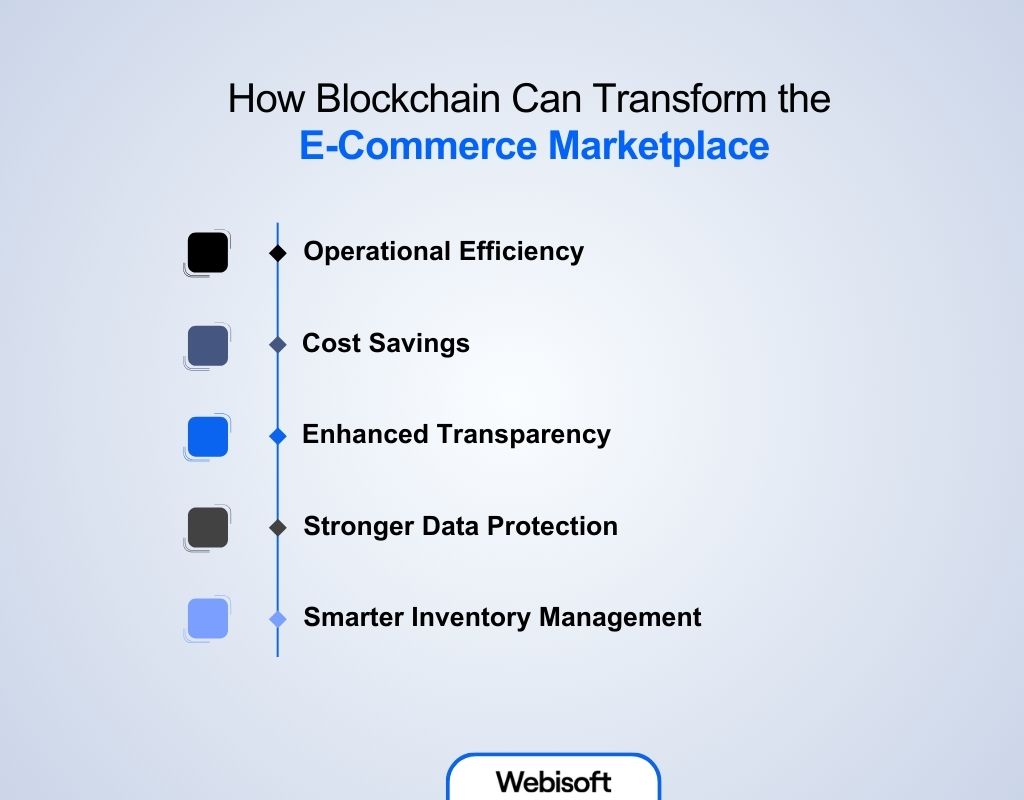 Blockchain is more than a security enhancement; it has the potential to fundamentally reshape digital commerce. By introducing automation, transparency, and decentralized control, blockchain brings long-term improvements to how businesses operate and how consumers shop online. These shifts highlight why many brands are exploring blockchain e commerce solutions as part of their future strategy.
Blockchain is more than a security enhancement; it has the potential to fundamentally reshape digital commerce. By introducing automation, transparency, and decentralized control, blockchain brings long-term improvements to how businesses operate and how consumers shop online. These shifts highlight why many brands are exploring blockchain e commerce solutions as part of their future strategy.
Operational Efficiency
Blockchain automates verification, record-keeping, and contract execution. This reduces manual tasks, speeds up workflow cycles, and minimizes human error. Retailers benefit from smoother operations end-to-end, from listing products to processing returns.
Cost Savings
Because blockchain reduces the need for third-party intermediaries, businesses save money on payment processing, data management, authentication, and logistics. But you need to know how to develop a blockchain application in a cost effective manner. These savings allow e-commerce brands to reinvest in customer experience and product development.
Enhanced Transparency
Every transaction or data entry is recorded on a tamper-proof ledger. This transparency improves accountability for suppliers, sellers, and logistics partners. For consumers, it ensures product authenticity and accurate information.
Stronger Data Protection
Decentralized data storage reduces the risk of breaches associated with centralized databases. Sensitive information remains secure, encrypted, and far less vulnerable to hacking attempts.
Smarter Inventory Management
Blockchain provides real-time, verifiable updates on product availability. This helps retailers avoid overstocking, reduce supply shortages, and optimize warehouse operations. It also streamlines demand forecasting and replenishment planning.
Real Examples of Blockchain-Based E-Commerce Platforms
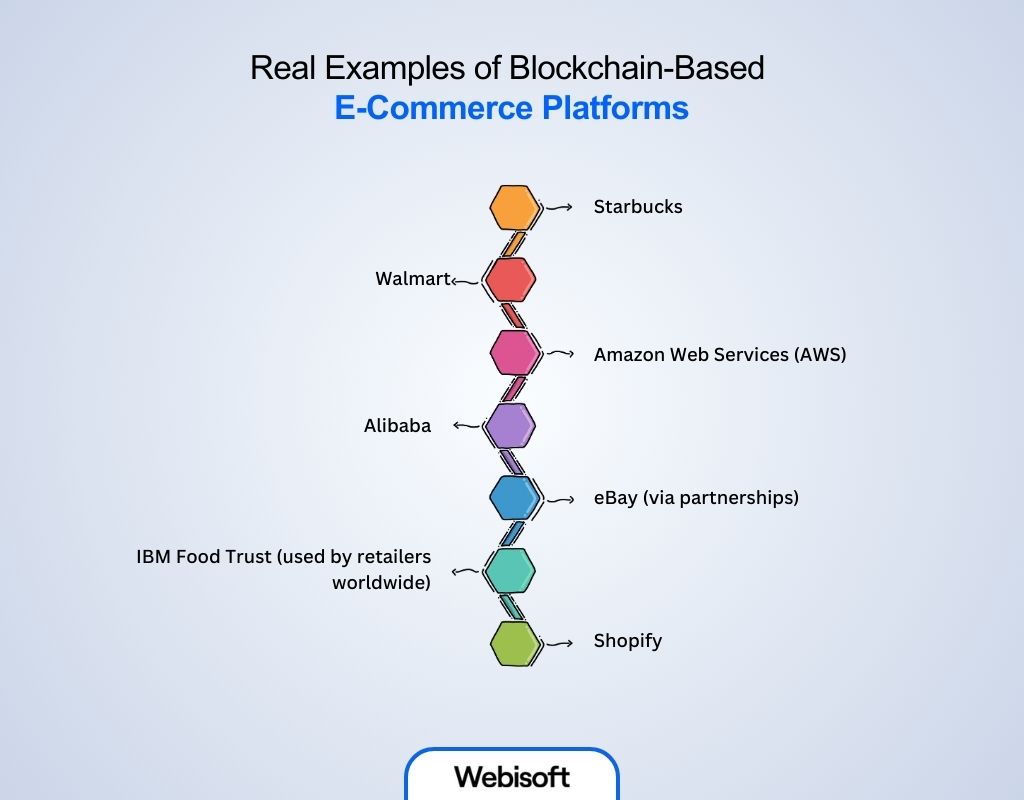 Many leading brands are adopting blockchain to improve traceability, strengthen data integrity, and secure customer transactions. These examples show how blockchain-based e commerce platforms and enterprise solutions are being used in real-world environments to solve long-standing industry challenges.
Many leading brands are adopting blockchain to improve traceability, strengthen data integrity, and secure customer transactions. These examples show how blockchain-based e commerce platforms and enterprise solutions are being used in real-world environments to solve long-standing industry challenges.
Starbucks
Starbucks uses blockchain to verify the ethical sourcing and quality of its coffee beans. Customers can scan product codes to see origin details, farming practices, and supply chain steps, boosting transparency and consumer trust.
Walmart
Walmart uses blockchain to track fresh produce across its supply chain. What once required days of investigation can now be traced in seconds. This ensures product authenticity, reduces contamination risk, and enhances food safety.
Amazon Web Services (AWS)
AWS provides blockchain templates that allow businesses to build secure ledgers, supply chain tools, and authentication systems. Retailers leverage AWS to experiment with blockchain e commerce solutions without heavy infrastructure costs.
Alibaba
Alibaba integrates blockchain for e commerce into its global logistics network to combat counterfeit goods. The system verifies product origins, shipment details, and supplier information, critical for protecting buyers in large cross-border marketplaces.
eBay (via partnerships)
While not fully blockchain-native, eBay collaborates with blockchain firms to authenticate high-value collectibles, luxury goods, and digital assets. This helps verify product legitimacy and eliminate fraudulent listings.
IBM Food Trust (used by retailers worldwide)
IBM’s blockchain network is used by major retailers to track food items through production and distribution. Companies using the platform include Carrefour, Nestlé, Dole, and Kroger, all benefiting from stronger product traceability and safety.
Shopify
Shopify allows merchants to integrate blockchain-based payment systems and NFT commerce modules. This gives store owners new ways to sell digital goods, accept crypto payments, and automate transactions using smart contracts.
Enhance your e-commerce ecosystem with secure and scalable blockchain solutions from Webisoft.
Get expert guidance, seamless integration, and custom blockchain features tailored for your online store.
Challenges of Using Blockchain in the E-Commerce Industry
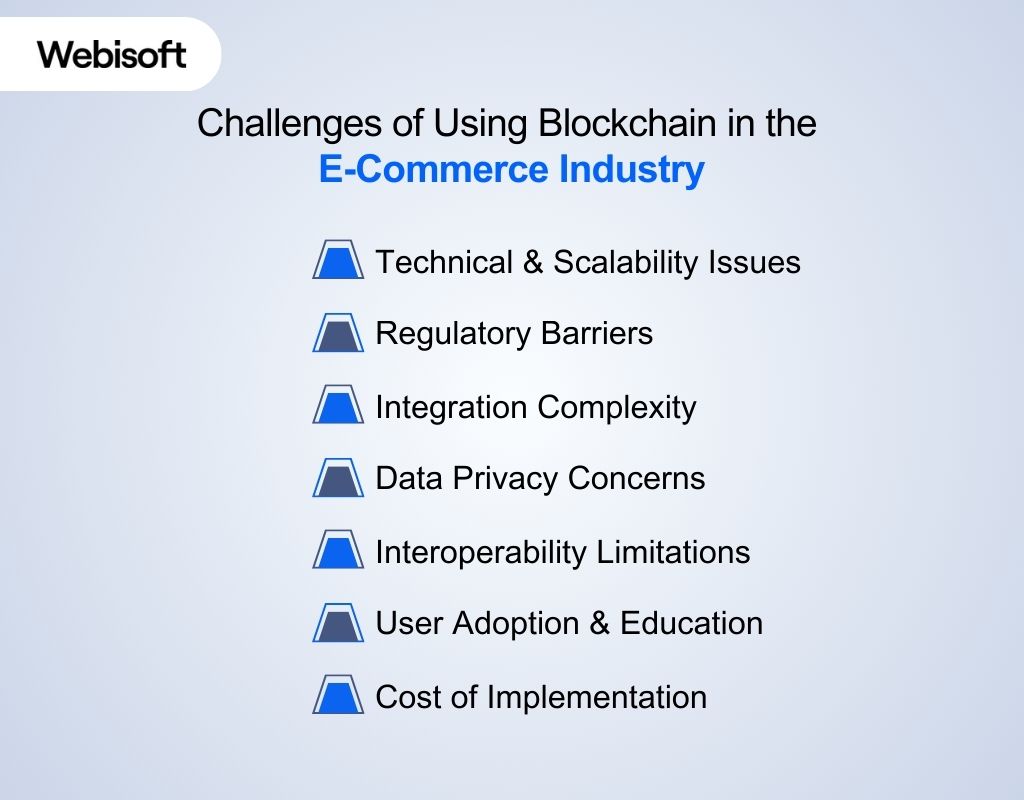 While blockchain introduces powerful innovations to online retail, it also comes with obstacles that businesses must understand before implementation. These challenges influence scalability, usability, regulatory compliance, and long-term sustainability of blockchain e commerce solutions. Below are the key hurdles affecting adoption in today’s digital marketplace.
While blockchain introduces powerful innovations to online retail, it also comes with obstacles that businesses must understand before implementation. These challenges influence scalability, usability, regulatory compliance, and long-term sustainability of blockchain e commerce solutions. Below are the key hurdles affecting adoption in today’s digital marketplace.
Technical & Scalability Issues
Blockchain’s decentralized structure can slow transaction processing, especially during peak shopping periods. As user activity grows, networks must handle larger transaction volumes without sacrificing speed, a challenge for many public blockchains today.
Regulatory Barriers
Governments worldwide are still developing legal frameworks for blockchain, cryptocurrencies, and smart contracts. Different regions may impose conflicting policies, creating uncertainty for retailers operating across borders. Developing a blockchain application must include compliance with the regulations of the market in which it will be used.
Integration Complexity
Implementing blockchain integration for e commerce requires modifying existing systems or building new infrastructure. Legacy platforms often lack compatibility with decentralized technologies, increasing development time and integration costs.
Data Privacy Concerns
Blockchain’s transparency can conflict with privacy requirements. While decentralized ledgers improve security, they also make it difficult to conceal sensitive data posing complications for businesses handling personal customer information.
Interoperability Limitations
Most blockchains operate on independent protocols. Connecting multiple networks or integrating them with traditional systems is still complex, limiting full adoption in multi-vendor e-commerce environments.
User Adoption & Education
Blockchain is still unfamiliar to many customers and businesses. Without proper education, users may hesitate to adopt decentralized payment models or trust blockchain-enabled platforms.
Cost of Implementation
Developing, testing, and maintaining blockchain systems comes with significant expenses. Businesses must invest in specialized developers, long-term infrastructure, and security tools, costs that can be especially challenging for small or mid-size retailers.
Best Practices for Blockchain Integration in E-Commerce
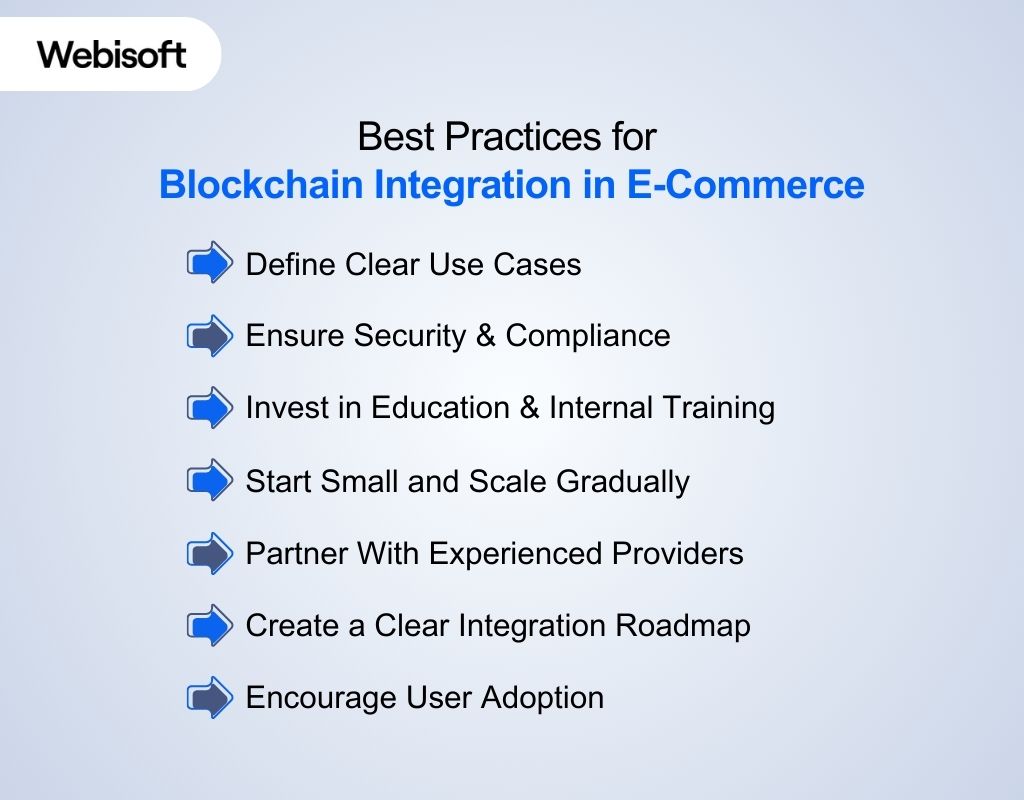 Successfully implementing blockchain for e commerce requires a strategic and well-planned approach. Businesses must evaluate their use cases, understand the technology’s limitations, and adopt practices that ensure smooth, secure, and scalable integration.
Successfully implementing blockchain for e commerce requires a strategic and well-planned approach. Businesses must evaluate their use cases, understand the technology’s limitations, and adopt practices that ensure smooth, secure, and scalable integration.
Below are essential guidelines for retailers looking to introduce blockchain into their digital operations.
Define Clear Use Cases
Instead of adopting blockchain for novelty, businesses should identify specific problems it can solve, such as supply chain transparency, secure payments, automated agreements, or fraud prevention. This ensures meaningful and measurable impact from the technology. Although it might sound insignificant, before jumping into blockchain development, it is the most important part.
Ensure Security & Compliance
Regulatory expectations vary across regions, especially in payments and data protection. Retailers must ensure that decentralized systems comply with privacy laws, industry standards, and cybersecurity requirements to protect users and maintain trust.
Invest in Education & Internal Training
Teams must understand how blockchain works, its capabilities, and its limitations. Educating internal staff and stakeholders helps retailers make informed decisions and evaluate blockchain applications in e commerce more effectively.
Start Small and Scale Gradually
Pilot testing allows businesses to identify challenges early and adjust before full-scale adoption of blockchain for e commerce. Start with limited blockchain modules, such as inventory tracking or secure payments, and expand as confidence grows.
Partner With Experienced Providers
Working with seasoned blockchain development firms reduces risk and accelerates integration. Expert partners guide architecture decisions, optimize performance, and ensure the deployed system matches the business’s operational needs.
Create a Clear Integration Roadmap
A structured plan is essential for successful implementation. Retailers should outline goals, timelines, technical requirements, and KPIs to ensure smooth blockchain integration for e commerce across existing platforms and workflows.
Encourage User Adoption
Clear communication and user-friendly interfaces help customers understand and trust blockchain-powered features. Educating users about faster payments, better transparency, and secure transactions encourages wider acceptance.
The Future of Blockchain and Cryptocurrency in E-Commerce
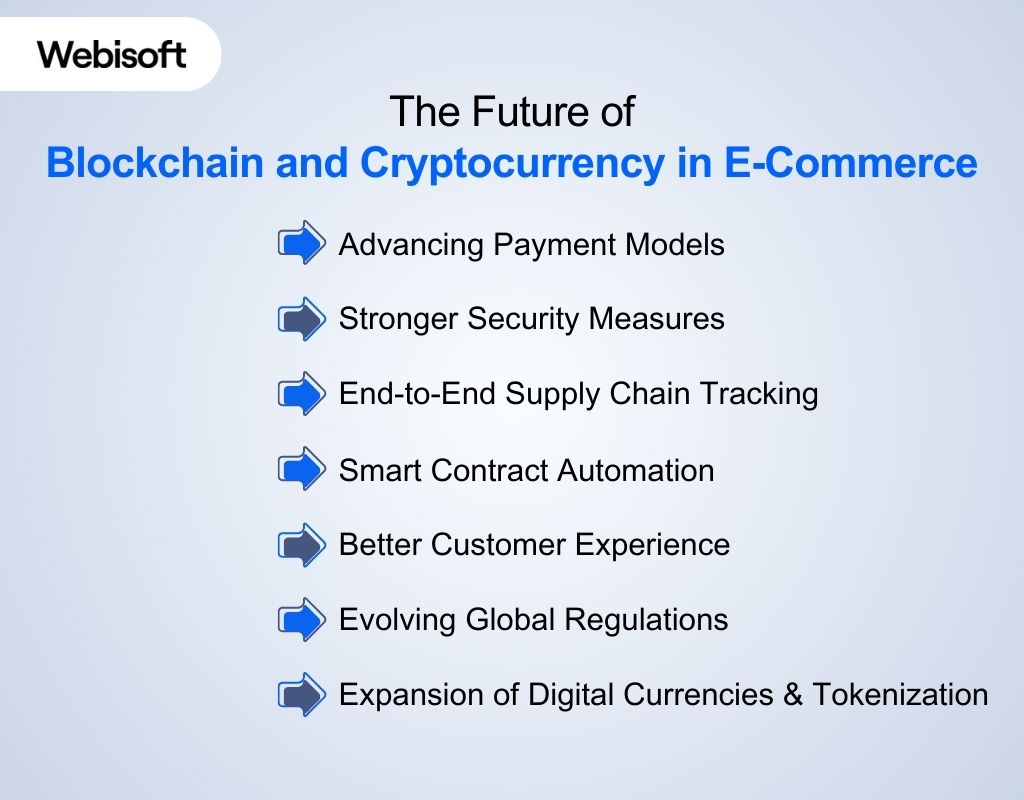 The future of online shopping is closely tied to blockchain and digital currencies. As decentralized technologies mature, they will reshape payment processes, supply chain operations, customer trust, and overall digital commerce experiences.
The future of online shopping is closely tied to blockchain and digital currencies. As decentralized technologies mature, they will reshape payment processes, supply chain operations, customer trust, and overall digital commerce experiences.
The next wave of blockchain e commerce solutions will focus on interoperability, automation, and intelligent data management to support global retail at scale. Below are the key trends shaping the future of blockchain and cryptocurrency in e-commerce.
Advancing Payment Models
Cryptocurrencies and blockchain-enabled payment systems will make global transactions faster, cheaper, and more secure. Businesses can bypass traditional banking barriers, settle payments instantly, and unlock new opportunities for cross-border commerce.
Stronger Security Measures
Enhanced cryptographic tools and decentralized infrastructure will protect customer data and transaction integrity more effectively than centralized databases. Retailers will adopt blockchain to reduce fraud and strengthen online privacy.
End-to-End Supply Chain Tracking
Real-time tracking will become standard, enabling consumers to verify product origins, sustainability claims, and shipping milestones. This transparency increases accountability and reduces counterfeit activity.
Smart Contract Automation
As smart contracts in e commerce become more advanced, retailers will automate tasks such as returns, warranties, vendor agreements, and conditional payments. This eliminates manual bottlenecks and improves efficiency across marketplaces.
Better Customer Experience
Blockchain’s traceability and automation reduce errors, improve delivery accuracy, and create trusted purchasing environments. Customers gain access to verified product information, faster checkouts, and secure digital interactions.
Evolving Global Regulations
Governments are developing regulatory frameworks for blockchain and crypto commerce. As rules become clearer and more unified, businesses will adopt blockchain with greater confidence and less uncertainty.
Expansion of Digital Currencies & Tokenization
E-commerce will increasingly incorporate token-based loyalty programs, reward systems, digital collectibles, and branded currencies. Tokenization opens new revenue models and deeper customer engagement opportunities.
How Webisoft Helps You Integrate Blockchain for E-Commerce
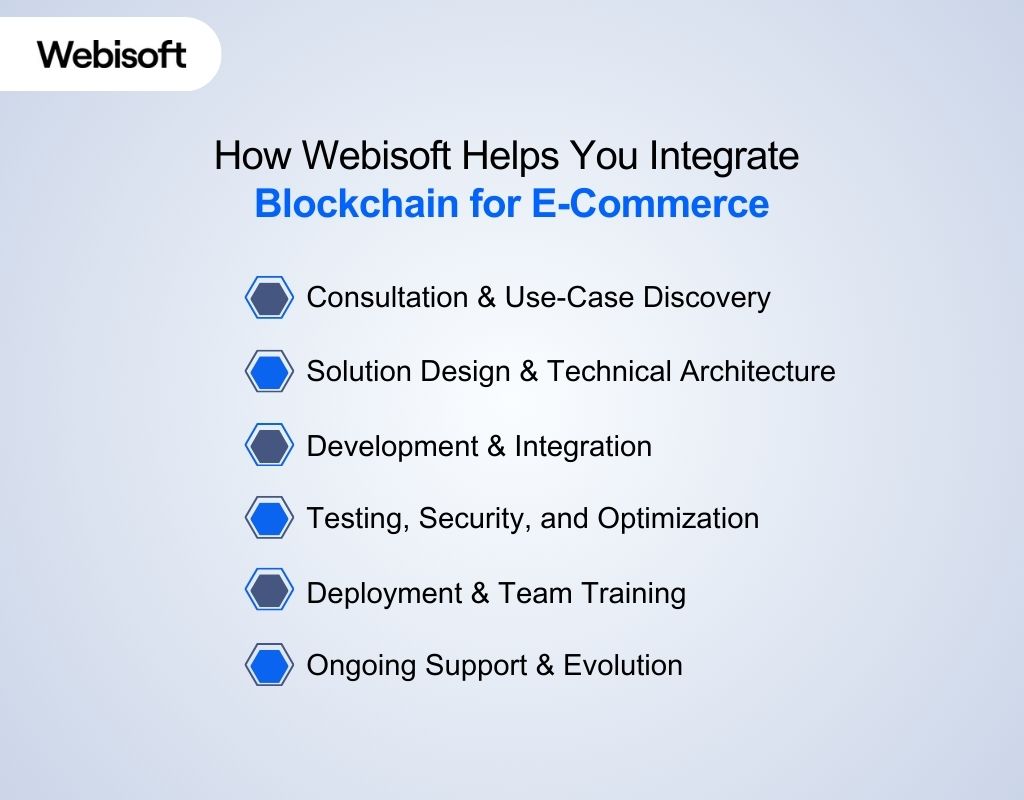 Implementing blockchain is a strategic move, but the transition can feel complex without the right technical partner. Webisoft makes the entire journey seamless by offering tailored development, clear guidance, and long-term support.
Implementing blockchain is a strategic move, but the transition can feel complex without the right technical partner. Webisoft makes the entire journey seamless by offering tailored development, clear guidance, and long-term support.
Our team helps businesses transform their platforms into secure, efficient, and future-ready blockchain-based e commerce platforms with precision and scalability. Below is how Webisoft empowers your e-commerce transformation from start to finish.
Consultation & Use-Case Discovery
We begin by understanding your business model, challenges, goals, and where blockchain can create real impact. Whether it’s supply chain transparency, secure payments, or automation, we map out the exact opportunities that best fit your needs.
Solution Design & Technical Architecture
Our experts design a custom blockchain architecture tailored to your platform. This includes selecting the right ledger type, outlining data flows, planning smart contract logic, and ensuring compatibility with your existing systems.
Development & Integration
Once the framework is approved, our developers bring your solution to life. We implement blockchain modules, build smart contracts, optimize workflows, and ensure smooth blockchain integration for e commerce with your current technologies and APIs.
Testing, Security, and Optimization
Every component undergoes rigorous testing to ensure reliability, scalability, and security. We validate performance, audit smart contracts, and verify data integrity across all transactional touchpoints.
Deployment & Team Training
After deployment, Webisoft ensures your team fully understands the new system. We provide onboarding, documentation, and training to make adoption smooth and intuitive for both internal teams and end users.
Ongoing Support & Evolution
Blockchain evolves, and your platform should too. Webisoft offers continuous monitoring, upgrades, feature enhancements, and post-launch support to keep your e-commerce ecosystem competitive and future-ready.
Enhance your e-commerce ecosystem with secure and scalable blockchain solutions from Webisoft.
Get expert guidance, seamless integration, and custom blockchain features tailored for your online store.
Final Thoughts on Blockchain for E-Commerce
blockchain for e commerce is reshaping how online businesses handle security, payments, and product transparency. Its decentralized design reduces fraud, strengthens trust, and improves efficiency across the entire shopping experience.
While challenges such as integration, regulations, and scalability still exist, ongoing innovation continues to make blockchain more practical for everyday e-commerce use. Companies that adopt it early gain a clear advantage in security, reliability, and operational performance. With the right technical support, blockchain becomes a powerful tool for building safer, smarter, and more efficient online marketplaces.
Frequently Asked Questions (FAQs)
Can blockchain reduce fraud in e-commerce?
Yes. Blockchain creates tamper-proof records of every transaction, making it extremely difficult for unauthorized users to alter data or commit fraud. This is why many retailers explore blockchain e commerce solutions to enhance platform security.
Are smart contracts useful in e-commerce?
Absolutely. Smart contracts in e commerce automate agreements such as payment releases, refunds, warranties, and delivery confirmations. This reduces manual work and prevents human error.
How does blockchain improve supply chain tracking?
Blockchain records each stage of a product’s journey, from manufacturing to delivery on an immutable ledger. This real-time traceability helps businesses verify product origins and ensures customers receive authentic goods.
Is blockchain necessary for all e-commerce businesses?
Not always. Blockchain is ideal when transparency, security, and data integrity are top priorities. Smaller stores or businesses with simple workflows may not need decentralized systems unless they require advanced features like traceability or automated contracting.
Will cryptocurrency become a major part of e-commerce?
Yes, cryptocurrency adoption is expected to grow as payment systems evolve. Faster settlements, lower fees, and improved global accessibility make digital currencies an attractive option for future e-commerce transactions.


